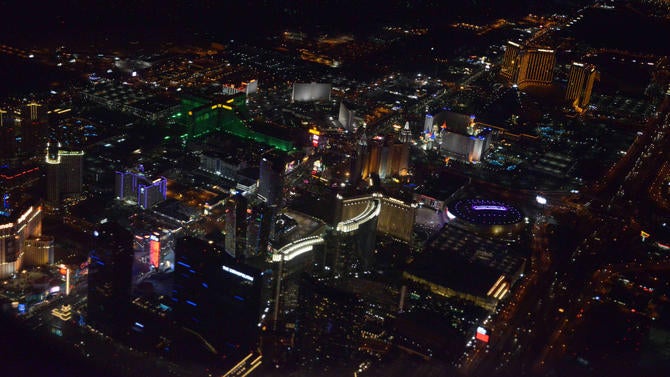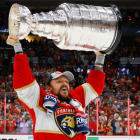It appears the NHL will be coming to Las Vegas as soon as the 2017-18 season. According to multiple reports, the NHL's nine-member executive committee was unanimous in its decision to recommend expansion ahead of the Board of Governors meeting on June 22 when the final vote will be collected. So while it is not official quite yet, it appears as good as done.
With that in mind, we decided to take a look at the things you need to know about the expansion team that will make the NHL the first of North America's big four professional leagues to put a team in Las Vegas.
1. Bill Foley is the billionaire behind the Las Vegas bid
When the NHL set an expansion fee of $500 million, some balked at the price. It's a lot to ask, but it also managed to separate those that were serious about bringing the NHL to a market from those that couldn't make the financial commitment. Bill Foley, the man behind the "Vegas Wants Hockey" movement, didn't flinch at the price.
With a building already in place -- T-Mobile Arena, which we'll get back to in a minute -- the infrastructure existed to make this happen, assuming he could afford the expansion fee. So who is Bill Foley?
Currently the chairman of Fidelity National Financial, Inc., Black Knight Financial Services and ServiceLink, Foley made his fortune in the finance world, according to his Fidelity National bio. He also runs a large restaurant business and founded his own wine company as an accomplished vintner, among other endeavors.
Foley has also partnered with the Maloof family, one of the more prominent families in the Las Vegas business scene, in ownership of the team. Former owners of the Houston Rockets and Sacramento Kings, the Maloofs have an opportunity to put a team in their own back yard now. In addition to their sports ownership, the Maloofs have previously owned major casino-hotels in Las Vegas and have a number of other business ventures.
2. T-Mobile Arena would be the team's home
The Las Vegas hockey team would play in the brand new T-Mobile Arena, which opened in April. Just off the Las Vegas Strip, near the New York, New York hotel and casino, the $375 million state-of-the-art facility was constructed in partnership between MGM Resorts International and AEG.
The building has a seating capacity of 17,500 for hockey and boasts 44 luxury suites.
With views like this&season tix deposits at $300, it isn't too late to be part of history https://t.co/7FUyT5JpDPpic.twitter.com/MU71icjIBm
— Vegas Wants Hockey (@LVWantsHockey) May 2, 2016
T-Mobile has already hosted a number of concerts and a boxing event, the Billboard Music Awards and Miss USA competition. It will also play host to UFC 200 on July 9 and UFC 202 in late August, in addition to a fairly full slate of concerts this summer.
The Los Angeles Kings have also scheduled two preseason games for T-Mobile Arena in October as the building will get its first taste of hockey. They will be playing the Colorado Avalanche and Dallas Stars on Oct. 7 and 8.
3. They don't have a name yet
Foley has not committed to a team name, but the West Point graduate is known to be partial to Black Knights. He has a financial services company by that name and at one point he was calling the Vegas ownership group Black Knight Sports and Entertainment. The website now lists the company as Foley/Maloof Sports and Entertainment, LLC.
The Black Knights has been widely panned as a potential nickname, though. The most recent pro hockey team that called Las Vegas home was known as the Wranglers. They played in the ECHL from 2003-14. Their predecessor was a team called the Las Vegas Thunder, which played in the old International Hockey League from 1993 to 1999. It is doubtful the ownership group would rehash those nicknames, so the possibilities are endless.
Las August, the Las Vegas Sun offered some suggestions for the team name. Among them, the Aces, Black Knights, Scorpions, Mustangs, Miners and Monsoon. The vote only brought back 885 respondents, so it's hardly definitive, but "Aces" was the overwhelming winner with 42 percent of the vote.

4. The NHL has already briefed teams on the expansion draft process
With an expansion team comes the need to fill the roster. The NHL has already constructed and briefed teams on how the expansion process will go. NHL deputy commissioner Bill Daly said that the format chosen should allow the team to become immediately competitive.
Here are some of the basics (via James Mirtle of the Globe and Mail):
- The Las Vegas team will be required to draft one player from every existing team and will have to select three goaltenders, nine defensemen and 14 forwards. They also have to pick players that, at a minimum, come with a combined value that would make up 60 percent of the salary cap. Obviously, they also can't go over the cap with their selections.
- NHL teams will have a choice between protecting seven forwards, three defensemen and one goaltender, or eight skaters of any kind and one goaltender (nine players). Each team can lose only one player to the expansion draft.
- Teams must protect players that have no-movement clauses that are active in the 2017-18 season. Anything before that will have no impact. That means teams may have to expose more of their younger players that haven't been granted no-move protection.
- NHL teams must expose at least two forwards and one defenseman who had played a minimum of 40 games the previous season or 70 games over the previous two seasons.
In addition to the expansion draft, the Las Vegas franchise will be eligible to participate in the 2017 NHL Entry Draft. They will be given the same draft lottery odds as the third-to-last team in the league and cannot pick later than sixth overall, according to Mirtle.
Teams that have a lot of players that have no-movement clauses on their roster very well could have to expose some of their top young players, which would be a boon for the Vegas squad.
This next year is going to be fascinating because of the number of players that will have to be exposed to the expansion draft. It could impact the trade market and how free-agent deals are structured. General managers are going to have to get creative and be particularly forward thinking in their maneuvers.
5. Will it work?
The big question on everyone's mind is how will putting a pro hockey team in a market saturated with other entertainment options survive? The good news is that Foley went to work right away on trying to prove there was a market for a hockey team, specifically.
The team has already collected deposits for more than 13,000 season-ticket packages. An important note about those ticket sales is that the first run of tickets were not made available to corporations or private businesses, to get a true test of fan interest. When it comes to selling luxury suites, they shouldn't have much problem with the many businesses that would be able to snap them up.
Additionally, Foley has expressed his commitment in growing the game in and around Las Vegas. They're hoping to get more people involved in the sport by growing the youth hockey community and providing the community at large more options to get out and skate. The team has committed to building a $17 million practice facility that will have two ice sheets that would be available for community use when not in use by the team.
Exclusive preview of Practice Facility Renderings, Be a part of history - https://t.co/zCZ6q7Dxiv#VegasWantsHockeypic.twitter.com/CCvWhWtWEU
— Vegas Wants Hockey (@LVWantsHockey) April 15, 2016
There's a lot of work to do when it comes to building up hockey in Nevada. According to USA Hockey's recently released membership report for the 2015-16 season, only 1,305 hockey players registered in the state of Nevada. That said, the presence of an NHL team led to massive growth in states like Texas, Arizona and North Carolina, so there's definitely growth potential anywhere when the game has more exposure.
There's no doubt that a venture like this brings great risk, but it's a calculated one for the NHL. They have a chance to be the only major pro sports game in town, with a growing population in the city and large transient population flooding the market.
Additionally, this building should have a really easy time drawing away team fans. It's in the middle of pretty much everything that's going on in Vegas. There's no doubt that this will become one of the most popular road trips in the league, too.
Today & everyday, we love all 14,000+ season tix holders/fans and can't wait to make Vegas proud! #VegasWantsHOCKEYpic.twitter.com/zIRWVAnlNQ
— Vegas Wants Hockey (@LVWantsHockey) April 28, 2016
It's a new and exciting time for the game that is sure to make for a lot of different storylines to follow over the next two years.


















